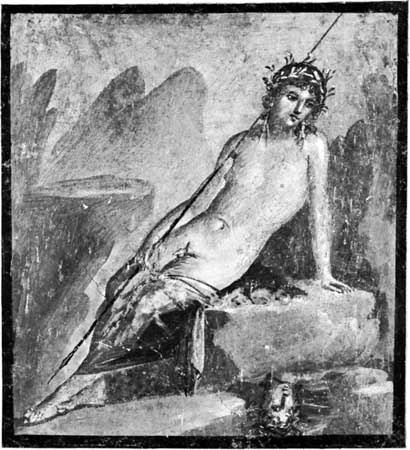Narcissus
Greek mythology
 in Greek mythology, the son of the river god Cephissus and the nymph Liriope. He was distinguished for his beauty. According to Ovid's Metamorphoses, Book III, Narcissus's mother was told by the blind seer Tiresias that he would have a long life, provided he never recognized himself. His rejection, however, of the love of the nymph Echo or (in an earlier version) of the young man Ameinias drew upon him the vengeance of the gods. He fell in love with his own reflection in the waters of a spring and pined away (or killed himself); the flower that bears his name sprang up where he died. The Greek traveler and geographer Pausanias, in Description of Greece, Book IX, said it was more likely that Narcissus, to console himself for the death of his beloved twin sister, his exact counterpart, sat gazing into the spring to recall her features.
in Greek mythology, the son of the river god Cephissus and the nymph Liriope. He was distinguished for his beauty. According to Ovid's Metamorphoses, Book III, Narcissus's mother was told by the blind seer Tiresias that he would have a long life, provided he never recognized himself. His rejection, however, of the love of the nymph Echo or (in an earlier version) of the young man Ameinias drew upon him the vengeance of the gods. He fell in love with his own reflection in the waters of a spring and pined away (or killed himself); the flower that bears his name sprang up where he died. The Greek traveler and geographer Pausanias, in Description of Greece, Book IX, said it was more likely that Narcissus, to console himself for the death of his beloved twin sister, his exact counterpart, sat gazing into the spring to recall her features.The story may have derived from the ancient Greek superstition that it was unlucky or even fatal to see one's own reflection. Narcissus was a very popular subject in Roman art. In Freudian psychiatry and psychoanalysis, the term narcissism denotes an excessive degree of self-esteem or self-involvement, a condition that is usually a form of emotional immaturity.
Roman official
died AD 54
freedman who used his position as correspondence secretary (ab epistulis) to the Roman emperor Claudius (ruled 41–54) to become, in effect, a minister of state.
Narcissus exercised great influence over Claudius and amassed the enormous personal fortune of 400 million sesterces. In 43 he represented Claudius in Gaul, overseeing the departure of the army for the invasion of Britain; that military success was the basis of Claudius's enduring popularity. Narcissus collaborated with Claudius's third wife, Valeria Messalina (Messalina Valeria), in protecting Claudius from various attacks. In 48 Messalina went through a marriage ceremony with her lover, the consul Gaius Silius. Narcissus informed Claudius, who was stunned and confused, and Narcissus obtained the emperor's permission to execute the lovers and their prominent associates. For his service to the emperor he was awarded the right to wear the decorations and garb of a quaestor (the lowest regular magistrate) and to be treated accordingly on public occasions (although he was not made a member of the Senate).
His power soon eroded. In 49 Claudius married his own niece Julia Agrippina (Agrippina, Julia) (Agrippina the Younger) instead of Narcissus's candidate. The freedman Marcus Antonius Pallas, who had promoted Agrippina's cause (and was rumoured to be her lover), received the right to wear the decorations and garb of a praetor, a magisterial rank superior to that of quaestor. Under their influence, Claudius recognized as his heir Agrippina's son (with Gnaeus Domitius Ahenobarbus (Ahenobarbus, Gnaeus Domitius)), Lucius Domitius Ahenobarbus (Ahenobarbus, Lucius Domitius), instead of his own son, Britannicus, who had been supported by Narcissus. In 52 Narcissus mismanaged the draining of the Fucine Lake (a project that was not fully successful until the 19th century). When Claudius died in 54—poisoned by Agrippina, it was popularly thought—her son, the new emperor, who had taken the name Nero, had Narcissus arrested and compelled him to commit suicide.
- gallstone
- Gallup
- Gallup, George Horace
- Gallus
- Gallus Caesar
- Gallus, Gaius Cornelius
- gall wasp
- Gallé, Émile
- Galois, Évariste
- Volta River
- Volter Kilpi
- Volterra
- Volterra, Vito
- voltmeter
- Volturno River
- Voltzia
- Volubilis
- volume, and average depth of oceans and seas Surface area
- volume Surface area, and average depth of oceans and seas
- volumetric analysis
- voluntarism
- Volunteers of America
- volute
- Volvo Aktiebolaget
- volvocid